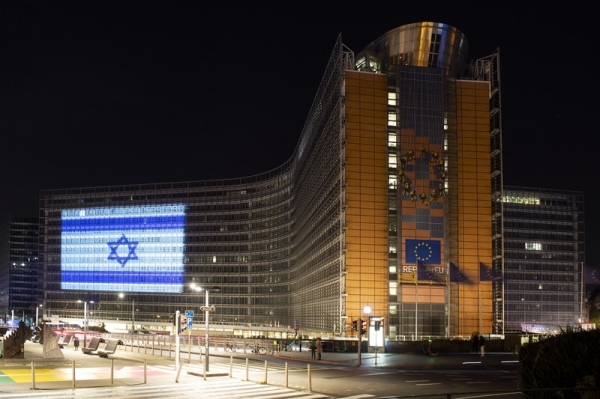EU civil servants call for Israel arms embargo, as dissent grows
More than 1,500 EU civil servants have signed a letter warning the bloc’s leaders of their legal obligation to contribute to peace, protect human rights — including the rights of children — and to ensure the application of international law in Gaza, in a sign of growing internal anger and dissent within the Brussels’ institutions over the bloc’s policy.
"As EU staff and EU citizens, we expect the EU leadership to lead by example and abide by the Treaty on the European Union", said the letter sent to Alexander de Croo, the Belgian prime minister and current EU chair, ahead of the EU summit on Thursday (1 February.)
The letter, seen by EU Observer, underlines that the number of people killed in Gaza since Israel began bombing the territory in the wake of the horrific Hamas attack on 7 October, "is almost equal to the total number of staff of the European Commission."
It calls for an arms embargo against Israel and the suspension of the EU-Israel cooperation agreement, saying EU decision makers have failed to use the whole range of tools at their disposal to influence Israel’s leadership so that it fulfils its obligations under international law, including its obligations as "occupying power".
As a result, Israel has access to a range of EU programmes, funding and agreements, "without any tangible progress in return for the situation of the Palestinians, let alone for a two-state solution", the EU officials underlined.
It was time to use EU leverage to bring the current military operations in Israel and occupied Palestinian territory to an end by taking measures similar to the ones targeting Russia over Ukraine, they added.
The letter is the latest sign of EU staff anger and frustration over the bloc’s Gaza policy.
Last October, over 800 EU civil servants voiced unease at European Commission president Ursula von der Leyen’s "strong and immediate support" for Israel.
EU staff also staged an unusual sit-in protest against EU policy on Gaza-in December last year while their colleagues in the Netherlands demanded an immediate ceasefire in Gaza.
Meanwhile, US government employees are planning to hold a "day of fasting for Gaza" this week to draw attention to Gaza’s humanitarian crisis and to denounce US president Joe Biden’s policy of uncritical support toward Israel.
Calls for an immediate ceasefire and condemnation of Israel’s alleged policy "genocide" also continue to be made in public demonstrations across the world.
Chances of a change in EU policy remain slim, however, as the bloc and its institutions remain split on calling for an end to hostilities and senior policymakers issue confusing and inconsistent statements on key issues.
An EU statement released shortly after the provisional ruling of the International Court of Justice on the case of genocide against Israel brought by South Africa, promised "full, immediate and effective implementation" of the decision.
This week, however, the European Commission said it was suspending aid to UNRWA in light of allegations of 12 staff involvement in the 7 October attack — despite UN warnings that the move would mean the collapse of the humanitarian system in Gaza and through the region.
Belgium, Ireland, Denmark, and Spain, the most critical EU voices on Israel, will continue their funding.
The staff letter also warned of the EU’s "growing isolation" due to the deterioration of its global reputation and leverage.
It added that EU leaders must urgently remedy a situation "where the EU’s foundation internally and credibility globally is questioned, as it fails to apply the same standards of international law in the situation in Israel/occupied Palestinian territory as it has done in other conflicts".

